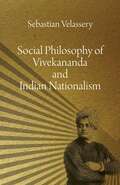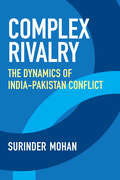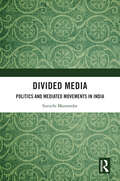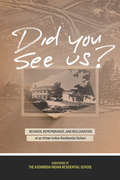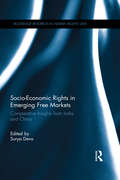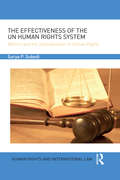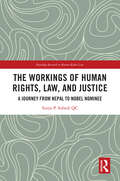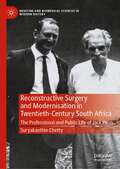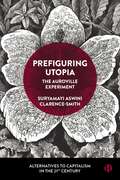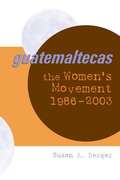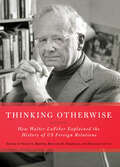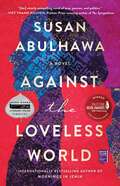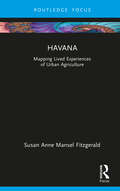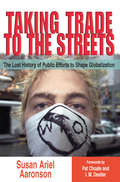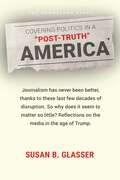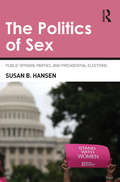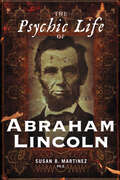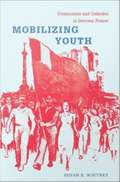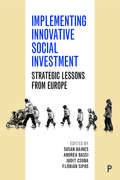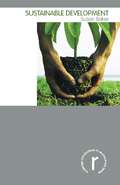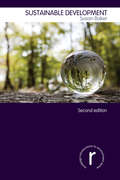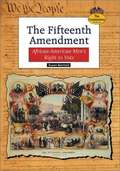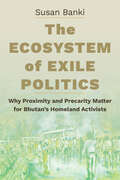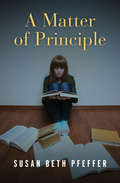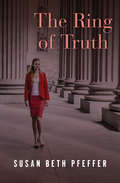- Table View
- List View
Social Philosophy of Vivekananda and Indian Nationalism
by Surinder Kumar LijharaAmong the galaxy of scholars, Swami Vivekananda stands out as a majestic tower of light who has given a new tempo to the building up of a new sense of nationalism in modern India. The uniqueness of Vivekananda was his endeavour to translate every ounce of
Complex Rivalry: The Dynamics of India-Pakistan Conflict
by Surinder MohanWhile a substantial body of research explains how the conflict between India and Pakistan originated and developed over time, a systematic and multivariate inquiry cutting across different IR paradigms to understand this rivalry is rare or limited. Surinder Mohan contributes to the understanding of India and Pakistan’s rivalry by presenting a new type of framework, also known as complex rivalry model. This comprehensive model, by not limiting its theoretical tool-kit to any single paradigm, is unique in its approach and better positioned to debate and answer baffling questions that the single-paradigm-based studies address rather inadequately and in isolation. This book, through an examination of fifty-seven militarized disputes between 1947 and 2021, explains the life cycle of India-Pakistan rivalry in four phases: initiation; development; maintenance; and a possible transformation/termination. Mohan delineates five specific conditions that evolved the subcontinental conflict into a complex rivalry: first, its survival in spite of the Bangladesh War and the end of the Cold War; second, its linkage with other rivalries; third, the inclusion of nuclear factor; fourth, the dyadic stability in the militarized disputes and hostility level despite changes in the regime type; and fifth, the dyad’s involvement in a multilayered conflict pattern. To break this deadlock and mitigate their longstanding differences, Mohan proposes that India and Pakistan must reframe their national priorities and political goals so that the new situation or combinations of conditions would assist their peace strategists to downgrade the dyadic hostility and implement risky policies to make headway to a promising transformation.
Divided Media: Politics and Mediated Movements in India
by Suruchi MazumdarThis book addresses the complex relationship between India’s evolving, emerging media landscape, the political and economic interests of diverse media actors, and movements opposing contentious issues such as market-based economic reforms and religious nationalism.Through the complexities of mainstream news media and emerging digital culture in the eastern city of Kolkata, this book foregrounds regional and linguistic variations in the studies of media, movements, and politics in India. By focusing on popular movements against agricultural land acquisition in the state of West Bengal, in 2006 and 2007, and contemporary citizen-led activisms, this book captures the tension between mainstream media’s political and commercial logic, movements and digital activisms questioning dominant development and religious nationalist agenda, and the possibilities of political diversity and democratic participation. Situating the study in a multi-hybrid digital space that intimately integrates the old and new media, this book draws on critical, thematic analysis of newspaper coverage, digital qualitative studies of techno-commercial features such as hashtags and viral videos, and extensive interviews. This book proposes the theoretical concept of a hybrid partisan system, and argues that heterogeneity –– the complex, dynamic interaction of commercially-run media’s political alliances, the commercial logic, and hybrid professional norms –– remains consequential for movement visibilities, but contributes to deep ambiguities and commonalities in core issues such as industrialization in a developing economy.This book would be relevant to scholars of journalism, political communication, media systems, and mediated activisms in communication studies, sociology, political science, and South Asian studies.
Did You See Us?: Reunion, Remembrance, and Reclamation at an Urban Indian Residential School (Perceptions on Truth and Reconciliation #5)
by Survivors of the Assiniboia Indian Residential SchoolThe Assiniboia school is unique within Canada’s Indian Residential School system. It was the first residential high school in Manitoba and one of the only residential schools in Canada to be located in a large urban setting. Operating between 1958 and 1973 in a period when the residential school system was in decline, it produced several future leaders, artists, educators, knowledge keepers, and other notable figures. It was in many ways an experiment within the broader destructive framework of Canadian residential schools. Stitching together memories of arrival at, day-to-day life within, and departure from the school with a socio-historical reconstruction of the school and its position in both Winnipeg and the larger residential school system, Did You See Us? offers a glimpse of Assiniboia that is not available in the archival records. It connects readers with a specific residential school and illustrates that residential schools were often complex spaces where forced assimilation and Indigenous resilience co-existed. These recollections of Assiniboia at times diverge, but together exhibit Survivor resilience and the strength of the relationships that bond them to this day. The volume captures the troubled history of residential schools. At the same time, it invites the reader to join in a reunion of sorts, entered into through memories and images of students, staff, and neighbours. It is a gathering of diverse knowledges juxtaposed to communicate the complexity of the residential school experience.
Socio-Economic Rights in Emerging Free Markets: Comparative Insights from India and China (Routledge Research in Human Rights Law)
by Surya DevaIn the last decade or so, China and India have emerged on the global stage as two powerful free market economies. The tremendous economic growth in China and India has meant that they have been able to lift millions of people out of the poverty trap. This growth has not, however, been without problems. Apart from worrying levels of environmental pollution, a significant number of people are still struggling to live a decent life as they do not have adequate access to basic needs such as food, health services, education, water, and housing. The traditional old age support mechanism is collapsing amidst push for urbanisation and the practice of nuclear families, while the alternative social security system has not been put in place. Both China and India stress the importance of socio-economic rights, have ratified the International Covenant on Economic, Social and Cultural Rights and have in place a strong legal framework for the realisation of such rights. The constitutions of China and India accord significant importance to socio-economic rights and the both countries have numerous laws, regulations and policies that seek to implement various socio-economic rights. This book investigates how the gradual adoption of free market ideology has impacted on the realisation of socio-economic rights in both India and China and how the constitutional and legal frameworks have made necessary adjustments. Chapters in this volume, which are written by academics of international standing, explore how these two countries have tried to overcome certain common governance challenges in realising socio-economic rights. The role played by courts in India and China in the protection and realisation of socio-economic rights is considered along with the use and limitations of public interest litigation in achieving these rights. Finally, the effectiveness of measures in realising socio-economic rights are evaluated in relation to specific rights such as the rights to food, health, education, social security, and gender equality.
The Effectiveness of the UN Human Rights System: Reform and the Judicialisation of Human Rights (Human Rights and International Law)
by Surya P. Subedi, OBE, QC (Hon)The UN human rights agenda has reached the mature age of 70 years and many UN mechanisms created to implement this agenda are themselves in their middle-age, yet human rights violations are still a daily occurrence around the globe. The scorecard of the UN human rights mechanisms appears impressive in terms of the promotion, spreading of education and engaging States in a dialogue to promote human rights, but when it comes to holding governments to account for violations of these rights, the picture is much more dismal. This book examines the effectiveness of UN mechanisms and suggests measures to reform them in order to create a system that is robust and fit to serve the 21st century. This book casts a critical eye on the rationale and effectiveness of each of the major UN human rights mechanisms, including the Human Rights Council, the human rights treaty bodies, the UN High Commissioner for Human Rights, the UN Special Rapporteurs and other Charter-based bodies. Surya P. Subedi argues most of the UN human rights mechanisms have remained toothless entities and proposes measures to reform and strengthen it by depoliticising the workings of UN human rights mechanisms and judicialising human rights at the international level.
The Workings of Human Rights, Law and Justice: A Journey from Nepal to Nobel Nominee (Routledge Research in Human Rights Law)
by Surya P. Subedi, QCDrawing on the personal experience of a leading international jurist, this book provides insights into the workings of international law and human rights from a global perspective that transcends the traditional divide between the West and the East, and the Global South and Global North. The work follows the author’s remarkable journey from a simple village in Nepal to becoming an international jurist acclaimed for his innovative academic and influential practical legal work and nomination for the Nobel Peace Prize. It offers insights into the powers bearing on international policymaking, the dynamics of human rights negotiations with governments, and the effects of their outcomes on the lives of their citizens. While much has been written on international human rights law, this inspirational memoir casts a new light on the working of human rights, law, and justice through the eyes of a leading actor. It provides a valuable contribution to the study of justice and human rights and the importance of individual action. As such, the book presents an accessible source for current debates around the development and effectiveness of international law and human rights and practices for decolonising these debates. The book will provide inspiration and practical guidance for students, academics, international lawyers, jurists, and human rights advocates.
Reconstructive Surgery and Modernisation in Twentieth-Century South Africa: The Professional and Public Life of Jack Penn (Medicine and Biomedical Sciences in Modern History)
by Suryakanthie ChettyThis book traces the career of pioneering South African plastic and reconstructive surgeon, Jack Penn, from its beginnings during the Second World War. It explores the establishment of Penn’s private practice, and his work in diverse countries, including Gabon, Japan and Israel, as he sought to rectify the injury caused by conflict. It also addresses his role on the President’s Council, established by Prime Minister P.W. Botha to introduce reform to the system of apartheid.Penn’s career is contextualised by modernisation which was a significant feature of twentieth-century South Africa. It was linked with race from the inception of the state in 1910 with racial segregation and paternalism. Penn’s work during the Second World War was part of a “modernist” bent by the state under Jan Smuts to take the lead in promoting science and technological development – which continued during apartheid. Modernisation was also fluid with state priority shifting between the two poles of development and security as apartheid policies were met with hostility both within the state and beyond its borders. Within the context of decolonisation, increasing black urbanisation required a balancing act on the part of the state to uphold the ideology of racial distinction while simultaneously addressing economic challenges – and this was reflected in the reform initiatives under Botha.Plastic and reconstructive surgery as evident in the work of Jack Penn is intertwined with this narrative of apartheid, modernisation and reform. It demonstrated Western prowess, with medicine and development a perceived bulwark against Communism. It also served as a means for the modernising apartheid state to initiate, maintain or enhance alliances with other states in the facing of mounting isolation and international condemnation.The career of Jack Penn, then, is a lens through which the contradictions, complexities and anxieties of twentieth-century South Africa are exposed.
Prefiguring Utopia: The Auroville Experiment
by Suryamayi Aswini Clarence-SmithAuroville in Tamil Nadu, South India, is an internationally recognized endeavour in prefiguring an alternative society: the largest, most diverse, dynamic and enduring of intentional communities worldwide. This book is a critical and insightful analysis of the utopian practice of this unique spiritual township, by a native scholar. The author explores how Auroville’s founding spiritual and societal ideals are engaged in its communal political and economic organization, as well as various cultural practices and what enables and sustains this prefiguratively utopian practice. This in-depth, autoethnographic case study is an important resource for understanding prefigurative and utopian experiments – their challenges, potentialities and significance for the advancement of human society.
Guatemaltecas: The Women's Movement, 1986-2003
by Susan A. BergerAfter thirty years of military rule and state-sponsored violence, Guatemala reinstated civilian control and began rebuilding democratic institutions in 1986. Responding to these changes, Guatemalan women began organizing to gain an active role in the national body politic and restructure traditional relations of power and gender. <P><P>This pioneering study examines the formation and evolution of the Guatemalan women's movement and assesses how it has been affected by, and has in turn affected, the forces of democratization and globalization that have transformed much of the developing world.<P>Susan Berger pursues three hypotheses in her study of the women's movement. She argues that neoliberal democratization has led to the institutionalization of the women's movement and has encouraged it to turn from protest politics to policy work and to helping the state impose its neoliberal agenda. She also asserts that, while the influences of dominant global discourses are apparent, local definitions of femininity, sexuality, and gender equity and rights have been critical to shaping the form, content, and objectives of the women's movement in Guatemala. And she identifies a counter-discourse to globalization that is slowly emerging within the movement. Berger's findings vigorously reveal the manifold complexities that have attended the development of the Guatemalan women's movement.
Thinking Otherwise: How Walter LaFeber Explained the History of US Foreign Relations
by Susan A. Brewer, Richard H. Immerman, and Douglas LittleThinking Otherwise addresses the question of what makes a great historian by exploring the teaching and scholarship of Walter LaFeber, widely acclaimed as the most distinguished historian of US foreign relations. This volume of essays, edited by Susan A. Brewer, Richard H. Immerman, and Douglas Little, is a testament to a scholar who published more than a dozen books during his time at Cornell University, where he delivered legendary lectures for half a century. The chapters trace LaFeber's journey as a scholar and demonstrate his enduring influence on the history of US foreign relations by linking six of his monographs to his abiding concern about the fate of the American experiment from the 18th century to the present. Thinking Otherwise explains and assesses the scholarship of a historian whose work became canonical in his lifetime and continues to resonate throughout public policy debates.
Against the Loveless World: A Novel
by Susan AbulhawaFrom the internationally bestselling author of the “terrifically affecting” (The Philadelphia Inquirer) Mornings in Jenin, a sweeping and lyrical novel that follows a young Palestinian refugee as she slowly becomes radicalized while searching for a better life for her family throughout the Middle East. For readers of international literary bestsellers including Washington Black, My Sister, The Serial Killer, and Her Body and Other Parties. <p><p> As Nahr sits, locked away in solitary confinement, she spends her days reflecting on the dramatic events that landed her in prison in a country she barely knows. Born in Kuwait in the 70s to Palestinian refugees, she dreamed of falling in love with the perfect man, raising children, and possibly opening her own beauty salon. Instead, the man she thinks she loves jilts her after a brief marriage, her family teeters on the brink of poverty, she’s forced to prostitute herself, and the US invasion of Iraq makes her a refugee, as her parents had been. After trekking through another temporary home in Jordan, she lands in Palestine, where she finally makes a home, falls in love, and her destiny unfolds under Israeli occupation. <p><p> Nahr’s subversive humor and moral ambiguity will resonate with fans of My Sister, The Serial Killer, and her dark, contemporary struggle places her as the perfect sister to Carmen Maria Machado’s Her Body and Other Parties. Written with Susan Abulhawa’s distinctive “richly detailed, beautiful, and resonant” (Publishers Weekly) prose, this powerful novel presents a searing, darkly funny, and wholly unique portrait of a Palestinian woman who refuses to be a victim.
Havana: Mapping Lived Experiences of Urban Agriculture (Built Environment City Studies)
by Susan Anne FitzgeraldFollowing the crisis of the Special Period, Cuba promoted urban agriculture throughout its towns and cities to address food sovereignty and security. Through the adoption of state recommended design strategies, these gardens have become places of social and economic exchange throughout Cuba. This book maps the lived experiences surrounding three urban farms in Havana to construct a deeper understanding about the everyday life of this city. Using narratives and drawings, this research uncovers these sites as places where education, intimacy, entrepreneurism, wellbeing, and culture are interwoven alongside food production. Henri Lefebvre’s latent work on rhythmanalysis is used as a research method to capture the everyday beats particular to Havana surrounding these sites. This book maps the many ways in which these spaces shift power away from the state to become places that are co-created by the community to serve as a crucial hinge point between the ongoing collapse of the city and its future wellbeing.
Taking Trade to the Streets: The Lost History of Public Efforts to Shape Globalization
by Susan Ariel AaronsonIn the wake of civil protest in Seattle during the 1999 World Trade Organization meeting, many issues raised by globalization and increasingly free trade have been in the forefront of the news. But these issues are not necessarily new. Taking Trade to the Streetsdescribes how so many individuals and nongovernmental organizations came over time to see trade agreements as threatening national systems of social and environmental regulations. Using the United States as a case study, Susan Ariel Aaronson examines the history of trade agreement critics, focusing particular attention on NAFTA (the North American Free Trade Agreement between Canada, Mexico, and the United States) and the Tokyo and Uruguay Rounds of trade liberalization under the GATT. She also considers the question of whether such trade agreement critics are truly protectionist. The book explores how trade agreement critics built a fluid global movement to redefine thetermsof trade agreements (the international system of rules governing trade) and to redefine how citizens talk about trade. (The "terms of trade" is a relationship between the prices of exports and of imports. ) That movement, which has been growing since the 1980s, transcends borders as well as longstanding views about the role of government in the economy. While many trade agreement critics on the left say they want government policies to make markets more equitable, they find themselves allied with activists on the right who want to reduce the role of government in the economy. Aaronson highlights three hot-button social issues--food safety, the environment, and labor standards--to illustrate how conflicts arise between trade and other types of regulation. And finally she calls for a careful evaluation of the terms of trade from which an honest debate over regulating the global economy might emerge. Ultimately, this book links the history of trade policy to the history of social regulation. It is a social, political, and economic history that will be of interest to policymakers and students of history, economics, political science, government, trade, sociology, and international affairs. Susan Ariel Aaronson is Senior Fellow at the National Policy Institute and occasional commentator on National Public Radio's "Morning Edition. "
Covering Politics in a "Post-Truth" America
by Susan B. GlasserIn a new Brookings Essay, Politico editor Susan Glasser chronicles how political reporting has changed over the course of her career and reflects on the state of independent journalism after the 2016 election.The Bookings Essay: In the spirit of its commitment to higquality, independent research, the Brookings Institution has commissioned works on major topics of public policy by distinguished authors, including Brookings scholars. The Brookings Essay is a multi-platform product aimed to engage readers in open dialogue and debate. The views expressed, however, are solely those of the author. Available in ebook only.
The Politics of Sex: Public Opinion, Parties, and Presidential Elections
by Susan B. HansenThe American cultural landscape has shifted considerably since the 1990s. As church attendance has declined, seculars have increased in number and in political involvement. The economy was supposed to be the most important issue in the 2008 and 2012 elections, but social issues such as gay rights and the status of women actually had a greater impact on vote choice. Moral issues and perceptions of candidate morality had less effect on voters in 2004 than in 2008. These arguments directly challenge the conventional wisdom concerning the 2004 and 2008 elections, which were supposedly decided on the basis of moral values and the economy respectively. Yet in The Politics of Sex, Susan B. Hansen justifies these claims theoretically based on evidence about how voters actually evaluate candidates. Hansen explores trends in public opinion on abortion, gay rights, and the status of women and finds that "values voters" are still crucial in presidential elections, even those supposedly fought over economic or foreign-policy issues. She then analyzes campaign strategies and vote choice to show how Barack Obama made effective use of the liberal trends in public opinion on social issues in 2008 and 2012. Hansen also examines trends in demographics, religious involvement, the institutional setting, and public opinion to predict who in future years benefit from the politics of sex. By providing an historical perspective on the changing impact of morality politics on presidential elections, this book will show how and why the politics of sex now favors the Democratic Party.
The Psychic Life of Abraham Lincoln
by Susan B. MartinezThroughout his life, Lincoln consulted oracles; at age 22, he was told by a seer that he would become president of the United States. In his dreams, he foresaw his own sudden death. Trauma and heartbreak opened the psychic door for this president, whose precognitive dreams, evil omens, and trance-like states are carefully documented in this bold and poignant chronicle of tragic beginnings, White House séances, and paranormal eruptions of the Civil War era. Aided by the deathbed memoir of his favorite medium, Lincoln's remarkable psychic experiences comes to life with communications from beyond, ESP, true and false prophecies, and thumbnail sketches of the most influential spiritualists in his orbit. Surveying clairvoyant incidents in Lincoln's life from cradle to grave, the book also examines the Emancipation Proclamation and the unseen powers that moved pen to hand for its historic signing.
Mobilizing Youth: Communists and Catholics in Interwar France
by Susan B. WhitneyIn Mobilizing Youth, Susan B. Whitney examines how youth moved to the forefront of French politics in the two decades following the First World War. In those years Communists and Catholics forged the most important youth movements in France. Focusing on the competing efforts of the two groups to mobilize the young and harness generational aspirations, Whitney traces the formative years of the Young Communists and the Young Christian Workers, including their female branches. She analyzes the ideologies of the movements, their major campaigns, their styles of political and religious engagement, and their approaches to male and female activism. As Whitney demonstrates, the recasting of gender roles lay at the heart of Catholic efforts and became crucial to Communist strategies in the mid-1930s. Moving back and forth between the constantly shifting tactics devised to mobilize young people and the circumstances of their lives, Whitney gives special consideration to the context in which the youth movements operated and in which young people made choices. She traces the impact of the First World War on the young and on the formulation of generation-based political and religious identities, the role of work and leisure in young people's lives and political mobilization, the impact of the Depression, the importance of Soviet ideas and intervention in French Communist youth politics, and the state's attention to youth after the victory of France's Popular Front government in 1936. Mobilizing Youth concludes by inserting the era's youth activists and movements into the complicated events of the Second World War.
Implementing Innovative Social Investment: Strategic Lessons from Europe
by Susan Baines, Andrea Bassi, Judit Csoba and Flórián SiposIntroduction and conclusion available Open Access under CC-BY-NC licence. The turn towards a Social Investment approach to welfare implies deploying resources to enhance human capital and mobilise the productive potential of citizens, starting in early childhood. This edited collection brings regional and local realities to the forefront of social investment debates by showcasing successes, challenges and setbacks of Social Investment policies and services from ten European countries: Italy, UK, Sweden, Finland, Greece, Germany, Poland, the Netherlands, Hungary, and Spain. It provides practical, accessible illustrations of good practice, routes to success, and lessons learned. The book is informed throughout by engagement with service users and local communities, and features many previously unheard voices including front-line workers, local decision makers, volunteers and beneficiaries.
Sustainable Development
by Susan BakerThe promotion of sustainable development opens up the debates surrounding our relationship with the natural world, what constitutes social progress, and the character of development in the present and into the future. Answering the need for an introductory, comprehensive, yet critical book that explores the challenges involved in the implementation of sustainable development, this revealing text investigates this subject across different socio-political and economic contexts. It combines an examination of the institutional engagement with sustainable development at a global level, with an empirically informed discussion on challenges facing high consumption societies, economies in transition and third world countries in their efforts to achieve sustainable development. Recognizing that promoting sustainable development is a quintessentially global task, the book focuses on the authoritative Brundtland formulation of sustainable development and the role of the United Nations Summits in promoting this vision. The empirical focus of the book is complemented by strong conceptual discussions as sustainable development is explored as part of new efforts, albeit tentative, to integrate environmental, economic and (more recently) social considerations into a new development paradigm. Providing an accessible, up-to-date and comprehensive treatment of the issues surrounding the promotion of sustainable development, this unique, internationally-focused book combines a strong conceptual analysis, with wide ranging empirical focus and a wealth of case material. Including summary points and suggestions for further reading, as well as web resources and an extensive bibliography, it is ideal for students, scholars and researchers in the fields of environmental sciences, politics, sociology and development studies.
Sustainable Development (Routledge Introductions to Environment: Environment and Society Texts)
by Susan BakerThe current focus on sustainable development opens up debates surrounding our relationship with the natural world, about what constitutes social progress and about the character of development, both in the Global North and the Global South. The promotion of sustainable futures is taking on a new urgency in the context of climate change and biodiversity loss. This concise and accessible text explores how the international community is responding to the challenge of sustainable development. It also investigates the prospect for, and barriers to, the promotion of sustainable development in high-consumption societies of the industrialised world, from the USA and the EU to the economies of transition in Eastern and Southern Asia. In Sustainable Development Baker considers the global impact of China’s industrial boom as well as how Chinese investments are shaping the prospects for sustainable development on the African continent. This global coverage is balanced by investigating how local action, ranging from the transition towns movement in the UK to the Green Belt movement in Kenya, can contribute to the pursuit of sustainable development. The second edition has been extensively revised and updated and benefits from the addition of three new chapters: sustainable development in China; the governance of sustainable development; and sustainable production and consumption. Climate change and biodiversity management have also been expanded into full chapters. Providing an up-to-date and comprehensive treatment of the issues surrounding the promotion of sustainable development, this unique, internationally-focused book combines a strong conceptual analysis with wide ranging empirical focus and a wealth of case material. Including summary points and suggestions for further reading, as well as web resources and an extensive bibliography, it is ideal for students, scholars and researchers in the fields of environmental sciences, politics, geography, sociology and development studies.
The Fifteenth Amendment
by Susan BanfieldExamines the amendment which gave AfricanAmerican men the right to vote and discusses the struggle that took place to regain this right when it was denied.
The Ecosystem of Exile Politics: Why Proximity and Precarity Matter for Bhutan's Homeland Activists
by Susan BankiThe Ecosystem of Exile Politics relays the events in Bhutan that led to the exodus of one-sixth of the population, and then recounts the activism by Bhutan's refugee diaspora that followed in response. Susan Banki asserts that activism functions like a physical ecosystem, in which hubs of activism in different locations interact to pressure the home country. For Bhutan's refugee mobilizers, physical proximity offers advantages in Nepal and India, where organizing protests, lobbying, and collecting information about government abuse in Bhutan is aided by being close to the homeland. But in an ecosystem of exile politics, proximity is both a boon and a bane. Sites proximate to Bhutan can be spaces of risk and disempowerment, and refugee activists rarely secure legal, political, and social protection. While distant diasporas in the Global North may not be in precarious situations, they cannot tap into the advantages of proximity. In examining these phenomena, The Ecosystem of Exile Politics adds to theoretical understandings of exile politics and to empirical research on Bhutan and its refugee population.
A Matter of Principle
by Susan Beth PfefferWhen Becca and her friends publish an underground newspaper, their principles are put to the test Becca and her friends are fed up with having their school paper controlled by the faculty. They want to run stories that reflect the real challenges high schoolers are facing at Southfield, and they'll do it themselves if they have to. Except when they do put out an independent underground newspaper, the first edition gets them into a lot of trouble. Becca's dad, a lawyer, is helping her stand on principle, but not everyone can afford to deal with the repercussions the same way she does--financially or emotionally. Can Becca learn to love her friends and still let them make their own decisions, even if they make mistakes? If she doesn't, she might not have any friends left.
The Ring of Truth
by Susan Beth PfefferThe truth isn't the most comfortable choice, but it's the only one with any future Sloan Fredericks can still remember the weeks she spent in the hospital when she was nine, the only survivor of the accident that killed her parents and little brother. Now she lives with her grandmother in the kind of grand old house you'd expect from a family known for both their wealth and their political prowess. It's also the kind of house that has a music room, which is where Sloan goes searching for a little peace and quiet during her gran's annual party, until an older man with a important reputation corners her long enough to say some things that Sloan doesn't want to hear. She quickly brushes past him, hoping that no one saw them. But someone did--one of Sloan's own friends--who confesses that the man did the same thing to her, only much, much worse. Although meant to be private, the confession doesn't stay that way, and soon the secret is all anyone can talk about. Can the truth save their family, or will it just dig up even uglier secrets?
